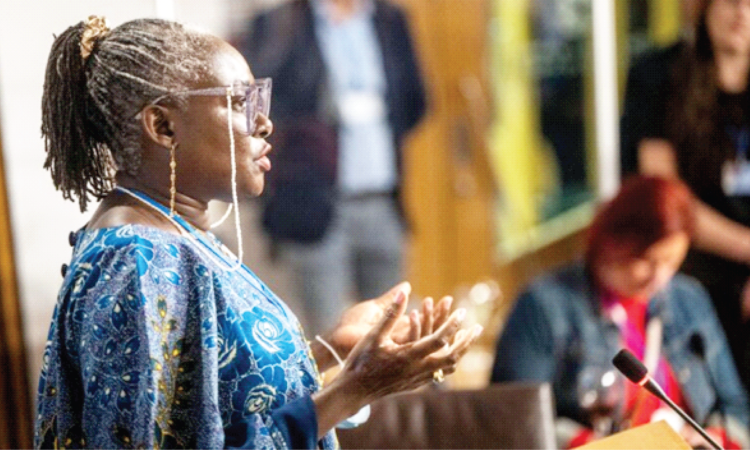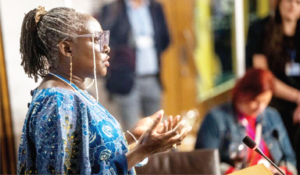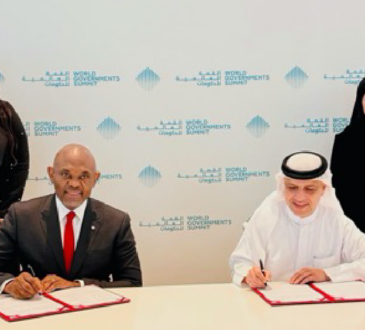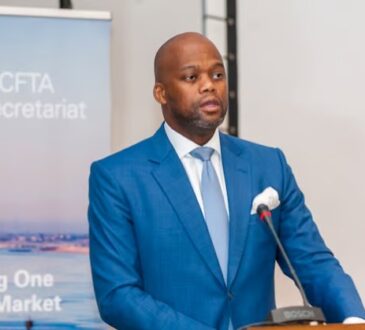The Interview | UK-Ghana relations: Adjoba Kyiamah talks investment and business opportunities

 The Executive Director of UK Ghana Chamber of Commerce, Adjoba Kyiamah, talks about the chamber’s efforts in strengthening cooperation between the United Kingdom and Ghana through investment, networking and business opportunities.
The Executive Director of UK Ghana Chamber of Commerce, Adjoba Kyiamah, talks about the chamber’s efforts in strengthening cooperation between the United Kingdom and Ghana through investment, networking and business opportunities.
Her chamber, she says, directly engages with both the Ghana and UK governments, policy makers, opinion leaders and all relevant stakeholders by lobbying and advocating on the interests and concerns of its members.
- Can you tell us about the work of the chamber and the strides you have made up to now.
The primary role of the chamber is to promote trade and investment between Ghana and the UK through the three platforms of networking, advocacy and trade services.
We engage with our members through networking events such as business clinics, sector specific seminars, masterclasses, webinars, surveys, round-table forums and one-to-one discussions and social activities. These networking events provide our members, the platform to build and raise their profile, get invaluable personal referrals and word-of- mouth advertising and explore business opportunities.
In terms of advocacy, the UKGCC directly engages with both the Ghana and UK governments, policy makers, opinion leaders and all relevant stakeholders by lobbying and advocating on the interests and concerns of its members.
We have positively influenced and made significant contributions, through our annual business climate survey reports, to policies and legislation, especially in tax policy, that are supportive of creating a conducive business environment in Ghana for the success and prosperity of the business community.
We always participate in key stakeholder meetings organised by Government.
- How has the chamber supported and facilitated trade and investment between Ghana and the UK? And which sectors of the Ghanaian economy have benefited significantly from these efforts?
We encourage and support local businesses to trade with the UK by helping to identify key opportunities for their business through our market research and due diligence services.
We work closely with Trade Advisors from the UK’s Department for International Trade (DIT), to guide businesses through the steps they need to take in trading with or investing in the UK and Ghana.
Through our membership of the British Chambers of Commerce, we have formed a strategic alliance with the global British Chambers of Commerce Network, comprising 53 Accredited Chambers in every region of the UK and British Chambers in over 75 markets across the world to provide full trade facilitation for our members.
Our out-bound trade missions have helped participating companies scale up operations and increased trade between the UK and Ghana. Bringing together prospective distributors, suppliers and potential customers we have facilitated many business matchmakings, B2B marketing and one-to-one business meetings.
For in-bound trade missions, we have organised networking events and B2B meetings for the guests with individual Ghanaian businesses, industry and trade associations.
- What, in your view, are the most critical business environment challenges that concern your member companies, and how has your advocacy helped to draw attention to or address these issues?
Poor access to and high cost of capital and land, quality of infrastructure and quality of government processes, taxation policy.
The UK Ghana Chamber of Commerce (UKGCC) has since 2019 been undertaking the business climate survey in Ghana to gather evidence to help identify and understand the bottlenecks to business growth and development, and to inform policy priorities.
The report captures direct sentiments and perceptions of the business community and is therefore a powerful policy advocacy tool to address challenges facing businesses in Ghana.
The report provides key inputs for our public dialogues on tax, which brings together key stakeholders in Government and the private sector to address the issues. Our tax advocacy has contributed to improved tax policy and administration in Ghana.
We also organise various capacity building and thought leadership programmes throughout the year to provide skills, business information and solutions to support the growth and development of businesses in Ghana. Participants get access to up-to-date and relevant industry insights and best practices, that enable them to upscale their businesses.

- Companies, as well as countries, are paying more attention lately to environmental, social and governance factors, as well as climate change risks, to ensure that they operate sustainably. How is the chamber integrating these issues in its work and advocacy?
The UKGCC stands for doing business in a socially responsible and ethical manner in accordance with the UK’s Bribery Act 2010.
The UKGCC conducts itself professionally reflecting the very best of the UK and Ghana in professionalism, culture and hospitality.
The UKGCC actively promotes all of the great accomplishments of its member companies in the areas of excellent human rights, the use of renewable energy, execution of net zero plans, recycling, efficient energy use etc.
- What is the chamber’s view on the African Continental Free Trade Area (AfCFTA), and how are you positioning your members to benefit from it?
The chamber supports the African Continental Free Trade Area (AfCFTA) agreement because we believe the resultant increase in intra-African trade will boost Africa’s growth, reduce poverty, and broaden economic inclusion.
- What opportunities do you anticipate for both Ghana and the UK, specifically in the areas of trade and investments, in the newly signed UK-Ghana Interim Trade Partnership Agreement?
The interim agreement will allow Ghanaian exporters to continue enjoying duty‑free and quota‑free access to the UK market, while UK exporters will continue to receive preferential tariff reductions to the Ghanaian market. This will undoubtedly boost trade and investment between the two countries. This is a great incentive to increase production and output, especially in the Agro-processing and fisheries sectors as well as lead to the development of infrastructure in Ghana.
For the UK this is the time to explore the opportunities in markets other than the EU, especially for products such as textiles and garments, mechanical and electrical machinery, and pharmaceuticals.
- Are there any sectors where UK-Ghana economic relations could be strengthened, and how?
Even though between the UK and Ghana governments, six sectors have been agreed to be given priority, (agri-processing; financial services; textiles/garments; pharma; digital; and extractives); as well as certain critical areas such as infrastructure development, tax, and the ease of doing business, the educational sector should also be strengthened, especially technical and vocational training, as it positively impacts Ghana’s poorest and most vulnerable people.
This can be achieved through providing technical support to Government institutions to improve governance and processes, building a conducive business and investment climate in Ghana, to increase investments from the UK, removing market access barriers to increase trade, and strengthening partnerships between UK and Ghanaian institutions.







